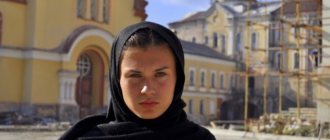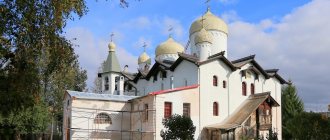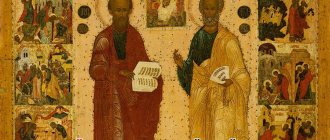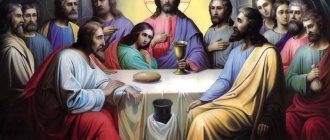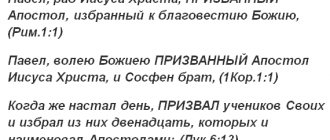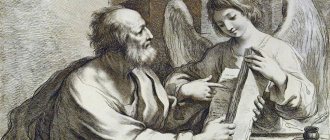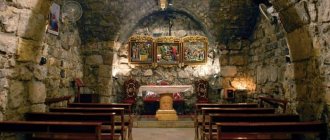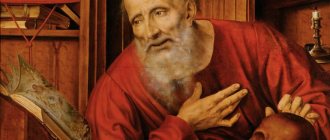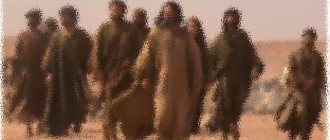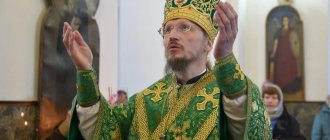My strength is in weakness: the pros and cons of the film “Paul, Apostle of Christ”
Everyone knows that the Church does not recommend working on Sundays and major holidays. And this is not just a ban for the sake of a ban. We want to preserve the feeling of the Divine presence, the closeness to Heaven that we receive during the Liturgy for as long as possible and not spill it with everyday routine activities and worries. And although each of us is required to be at our workplace on a working day, the evening, as a rule, is free. And we recommend dedicating this evening of the Feast of the Holy Apostles Peter and Paul to watching a new feature film - “Paul, Apostle of Christ.”
It's no secret that lately Hollywood's interpretation of biblical stories has caused bewilderment at best, and indignation bordering on anger at worst. The reinterpretation of the Holy Scriptures in the spirit of the “spiritual” quest that is fashionable today, which American scriptwriters offer us, actually does not contain anything modern. Therefore, I did not expect anything good from the film “Paul, Apostle of Christ”. And I was wrong.
Evangelist Luke in the film was played by Jim Caviezel, known for the role of Christ in Mel Gibson's film "The Passion of the Christ"
The plot, in principle, is quite simple and is mostly borrowed (in some places literally) from the book of Acts, some texts of the Apostle Paul and Christian Tradition.
The events of the film take place in Rome in 67 AD and tell about the last days of the life of the once Saul, and now the Apostle Paul. It is known that he suffered martyrdom during the reign of Emperor Nero, who accused Christians of setting fire to the Eternal City (the arson itself and the events surrounding it are beautifully described in Henryk Sienkiewicz’s book “Camo is Coming”).
According to the plot, Nero throws Paul into prison, where his faithful disciple and colleague on the second missionary journey, a doctor named Luke, arrives to him, who writes the Gospel from the words of the apostle. The warden of the prison, Mauritius, learns about the meetings of these two followers of Christ and plans to use the situation to regain the favor of the emperor. I will not spoil or retell the plot further, but I would still like to draw attention to some points.
The budget, by today’s standards, is absolutely “meager” - only five million dollars, which, by the way, almost immediately paid off more than four times. But despite this, the film’s cast is pretty good. Judge for yourself. Jim Caviezel, known for his role as Christ in Mel Gibson's The Passion of the Christ, played Luke. Downton Abbey star James Faulkner, who also appeared in Game of Thrones, played the role of the Apostle Paul. Joanne Whalley, who played in the TV series “Our Era. Continuation of the Bible,” embodied the image of Priscilla. And Olivier Martinez, known for the TV series “Texas Rising,” played a prison guard. How the director and producers managed to persuade all these people to take part in the filming of a film with such a limited budget is unknown. Especially when you consider that the scenery and some scenes in the film are so believable that they allow you to fully experience the atmosphere and setting that the authors of the film tried to recreate. Just look at the episode in which Christians are burned as lanterns in Nero’s garden!
The external surroundings are fully consistent with the acting of the actors, who performed their roles at the highest level. Also worth noting are the costumes and cinematography.
As for the philosophical component of the picture, there is something to be said here too. Roman society, as portrayed by director Andrew Hiatt, is painfully reminiscent of modern society - the same thirst for money and entertainment, lack of interest in life and the very meaning of life. The Romans do not understand that the power that came from the East is capable of destroying it and creating a new world in which there will be different values and different foundations. A handful of weak (physically) and poor (materially) people have what all the powerful and rich of this world do not have - faith and convictions. And it is faith and conviction that ultimately defeat rich and seemingly indestructible human pride. It seems that Hiatt is warning modern society and at the same time giving it hope - you can only be saved in Christ and with Christ, and even if your head is cut off, this does not mean that you have lost.
Downton Abbey star James Faulkner as Apostle Paul
In addition, I would recommend paying special attention to the dialogues, which, despite their apparent simplicity, are quite deep in meaning and content.
Naturally, there are also points that look both completely wrong from a historical point of view and too controversial from a theological point of view. It primarily concerns a dispute between Christians over whether to rebel against Rome, and scenes in which Christians attempt to free Paul from prison by force of arms. Yes, today something similar could happen, but then...
The fact is that Christianity won precisely because it offered a completely different view of the world, and the words of the Apostle Paul “my strength is made perfect in weakness” illustrate this perfectly. At the same time, we can remember that already at the beginning of the 2nd century, some zealous Christians wanted to free Ignatius the God-Bearer from prison and help him avoid martyrdom. But nowhere is it said that they proposed to do this with the help of a sword, and secondly, the saint himself forbade them to do this. Not only because bloody reprisals against enemies are not the Christian path, but also because he sought martyrdom, which was perceived as the great mercy of God. Therefore, we will not find any hints, even the slightest, that the ancient Christians were preparing an armed uprising in any literary source.
Another disadvantage of the film is its unclear plot. At the very beginning of the film, the viewer is made to understand that the time that describes the events taking place is very dangerous for Christians. However, it is only in the second part of the film that it becomes clear where the plot is going, what its premise and main message are.
Of course, in the film “Paul, Apostle of Christ” there are many times more positive moments than negative ones. And most importantly, it seems to me that he is able to move a Christian to a deeper study of his faith, especially the New Testament texts, and he is able to move an unbeliever or non-Christian to ask the right questions, on which the correct answers largely depend. The film is brutal (it's not easy to watch people burn alive or children go to their deaths in the Coliseum), but it tells the truth about what happened. And most importantly, he talks about Christ, because ultimately, the story is about Him, and not about Paul...
Icon of the Apostle Paul
The saint is often depicted at full height. He usually has a dark beard and wears a blue chiton and a dark red cloak. The main attribute of the apostle is a book, which is designed to remind us of the fourteen New Testament epistles. Sometimes he is depicted with a sword. Believers interpret this image in different ways. Sometimes the sword is perceived as a symbol of execution, because it is known that the apostle’s head was cut off. In another case, the sword symbolizes the spiritual weapon with which the preacher carried out his educational activities.
Description and location of the miraculous icon
The most famous icon was painted by Andrei Rublev. This is a waist-deep image, where the apostle is written sad, immersed in his thoughts. He holds in his hands the Holy Scriptures, which today are considered canon.
Andrei Rublev worked on the territory of the Vladimir Assumption Cathedral. It is there that the personalized belt icon now rests.
How does the image of St. Paul help?
The relics of the apostle are venerated daily by hundreds of pilgrims from all over the world. Paul traditionally helps to find peace and strengthen faith. In addition, before the icon they often pray for:
- instructing sinners on the true path;
- endowment with patience and courage while struggling with difficulties;
- changing life for the better.
Pavel often helps with the start of construction work. Prayers are offered to him when they plan to build a house.
The villain will be revealed in the finale
— Were there any scenes in which the actors risked their lives?
— Everything that happens on the site must be controlled. There was a difficult scene in episode 11 where the actors are running on the roof of a moving train.
| PONTON CROSSING: the film uses a lot of wartime equipment |
One day the stuntmen were filming, and the next day, due to many close-ups, the actors themselves were filming.
Of course, there was some risk, but Zhenya and Kolya could have refused when they read the script. There is a scene on the snow-covered roof of a house: Mironov runs away, Fomenko catches up. Of course, the actors worked with insurance, but everything looks authentic on camera. — Part of the film was filmed in Tunisia. Did you swim in the sea every day? “We had no time to enjoy the local beauties, we were filming from dawn to dusk, everyone was simply overwhelmed. There were changes in the script, literally some things were invented and remade on the fly. Believe me, until the last five minutes the viewer will not be able to guess who the main villain in this story is. — Which other stars starred in the film? — Andrei Smirnov, he plays Yevgeny Mironov’s father, and the wonderful Larisa Malevannaya, she is still in great shape, plays Fomenko’s mother. — Will there be love in the picture? - Certainly. A very touching story of Zhenya Mironov and Dasha Moroz.
| LIDA AND PAVEL: Dasha Moroz speaks enthusiastically about her partner |
— How do you generally feel about erotic scenes in films?
“We don’t know how to remove them.”
And artists don’t feel free in front of the camera. You have to overcome two hundred complexes to undress. When I was young, when I was filming a movie, I undressed on camera. And now I try to film these scenes in such a way that the artist does not feel ashamed. I always show what happened on the monitor and ask if everything is satisfactory. Nowadays we can always remove the “extra” on the computer. — Why is it taking so long for your film “The Brothers Karamazov” to be released? — The composer was replaced. Otherwise the film would have been released in December. I hope the film will be released early next season. — What is your next project? — In May I will start working on the film “Pelagia and the White Bulldog” based on the story by Boris Akunin. — Will your girls - your wife and daughter - be filming there? — Casting is now underway, their candidacies are also being considered.
Mironov learned to crack safes
| EXILED TEACHER: I didn’t imagine that I would become a saboteur |
Evgeny Mironov does not have standard roles: each character he plays is a unique challenge to his own acting capabilities.
So in “The Apostle” he had to play two characters with absolutely opposite characters: twin brothers, one of whom is a seasoned criminal, a German saboteur, a predator. The other is a quiet, bespectacled school mathematics teacher, condemned as an enemy of the people to exile in Solovki. — Evgeniy, did you have any doubts about whether to star in “The Apostle”? “I read two huge volumes of the script overnight and agreed to the role without hesitation, although for the sake of the film I had to leave my work in the theater for a while. “The Apostle” reminded me of such wonderful Soviet paintings as “Shield and Sword”, “Meeting Place...”. This is an interesting acting job, and besides, I had to learn a lot of new skills: boxing, skydiving, sambo techniques, safe-cracking. There is a lot of action in the film, and we, the actors, did most of the stunts ourselves.
Yuri Moroz does not film actors who drink
— Why is the film called “Apostle”?
— Firstly, this is the call sign of the main character.
In addition, one of the important themes embedded in the film is the clash of faith and fascism. The hero of Yevgeny Mironov, on the one hand, fights against Soviet ideology, on the other, against German ideology (the film takes place in 1942), but only faith helps him win. Therefore, the apostles Peter and Paul are constantly present in the picture. — Is “Apostle” your own child or an adopted one? After all, another director started the film - Gennady Sidorov. - Dear, because so much effort has been put into it. At first I was a co-producer, and then I finished the film. — Did you participate in the casting? “I had something to do with this as a co-producer. But Dasha Moroz, if you wanted to ask about this, was invited to the project before me. She has a very complex dramatic role. The heroine is brought a dead husband, and she sees that it is not him. She declares this and as a result ends up in a psychiatric hospital, from where she later escapes.
| ISTOMIN AT THE ABWERH SCHOOL: the Nazis did not notice the substitution |
It seems to me that Dasha coped with her task, although it was not easy to keep the bar next to such a virtuoso as Evgeniy Mironov.
He's a brilliant artist. He and I think the same way, I can go to the side, and he himself will set up the mise-en-scene, say where the camera should be, set the light. He is his own director, the creator of his own role. It’s a pleasure to photograph such an artist. — How was it working with Nikolai Fomenko? Still, he is more of a showman than an actor. — There were few scenes with Kolya in my part of the film. There were no questions. He liked the role and played it. He spent many years becoming a showman, and now he will have to distance himself from this for a long time. It is impossible to combine incompatible things, and in the end he will have to choose one thing. If I were in charge of casting, I would take someone else, but not a showman. — You had another “underwater pebble” - Alexander Bashirov. It is known that this actor really likes to drink... - I only worked with him for one day. In general, as a matter of principle, I don’t photograph actors who drink. He didn’t act in one place, and I regret that this scene didn’t turn out the way it could have been.
Dad doesn't give Daria Moroz any concessions
She got the difficult role of Pavel’s wife, Lida. Her reluctance to believe the version of her husband’s death leads her to a mental hospital, separates her from her son, but does not force her to abandon her husband and betray their love.
| YURI MOROZ: does not make relative concessions on the set |
— Dasha, was the role difficult?
- Crazy!
Especially the scene where Lida identifies her husband’s corpse: everything is in close-up, you can’t fake it even in the smallest things. For the first time I played not a girl, but a real woman: with family, love. Zhenya Mironov helped a lot in coming up with parts of the scenes and suggested acting tricks. For example, before a difficult emotional scene, you should run hard to get physically tired. He is a genius. You know, even his look changed when he played first one brother, then another. — Did your father, director Yuri Moroz, help you? “My father and I talked about the role, the profession, but he never made any concessions to me.
On the set, I am not a daughter, but an actress. He didn’t cast me in The Brothers Karamazov, but he saw me as the heroine of The Apostle. Although for the sake of the role he insisted that I cut off my long hair. GEOGRAPHY
* The film group “Apostle” found War Berlin in Prague, however, they had to work at night so that modern cars and passers-by would not get into the frame. * A German concentration camp and a school for saboteurs were “broken” on the territory of the Kirillo-Belozersky Monastery in the Vologda region, the dungeons of the “Lubyanka” became the basements of the Hospital named after. Burdenko, but Moscow in 1942 was filmed in Minsk, on the streets of which there is practically no outdoor advertising. * A film crew worked in France, Serpukhov and Tunisia, where they filmed the “Iranian” part.
#14/2008
Nikolai Fomenko blew away the showman
The actor plays NKVD captain Alexei Khromov, who came up with the idea of replacing the dead saboteur with his twin brother and sending the poor fellow to a German intelligence school.
| NIKOLAI FOMENKO: almost burned out at work |
In fact, this character is the antagonist of the main character Pavel Istomin, because in order to turn a school teacher into a seasoned spy and repeat offender, it is not enough just to give him tattoos.
Khromov has to literally break his ward in order to mold him into a new personality. — Nikolai, how do you feel about playing such a negative character? - In fact, there are no negative and positive actions, everything is relative. Everyone has their own truth. There are the same number of Khromovs as there are Istomins, and, believe me, this hero is different depending on the situation. — Are you satisfied with the result? “I may never have work of such depth and quality in cinema again.” The role is so serious that it will “blow away” the audience’s recent perception of me as a showman. By the way, screenwriter Oleg Antonov says that he wrote this role especially for me. — What is your most memorable day of filming? — In one of the scenes, Zhenya Mironov and I almost got burned. The wiring in a rare GAZ M-1 car caught fire: smoke poured out from under the hood and sparks fell. The fire was extinguished with improvised means, but later the gas car was not started, but was transported on a cable.
